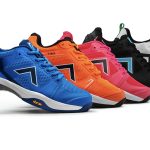Three sportswear and outdoor brands – Adidas, Reebok and Patagonia – are leading the way on transparency amongst the world’s 200 largest fashion brands and retailers by disclosing a wide range of human rights policies, commitments and outcomes, as well as who their suppliers are, Fashion Revolution’s Fashion Transparency Index 2019 revealed.
Adidas, Reebok and Patagonia each score a total 64 percent out of 250 possible points, followed by Esprit and H&M in the 61-70 percent. C&A, ASOS, Puma, Nike, Converse, Jordan, The North Face, Timberland, Wrangler, Vans and Marks & Spencer rank at the top end of the 51-60 percent range.
This is the first year since the Fashion Transparency Index’s inception that brands scored over 60 percent, showing that progressive brands are now taking real, tangible steps to disclose more about their social and environmental policies, practices and impacts, according to Fashion Revolution.
No brands score above the 70 percent range showing that there is still a long way to go towards transparency among all major fashion brands.
Since 2016, Fashion Revolution has tracked global brands and benchmarked their performance against five key areas: policy and commitments, governance, traceability, supplier assessment and remediation, and spotlight issues, which this year focuses on the Sustainable Development Goals.
Sarah Ditty, policy director and report author, said: “The progress we are seeing this year, coupled with the feedback Fashion Revolution has received from brands, suggests that inclusion in the Fashion Transparency Index has motivated major fashion brands to be more transparent. We are seeing many brands publishing their supplier lists and improving their scores year on year.”
Amongst the 98 brands reviewed in 2017, 2018 and again in 2019 there has been an 8.9 percent increase in the average score since they were first included in the Index.
Eleven brands have increased their scores by over 10 percent this year, showing significant efforts to be more transparent, and data shows that more brands are embarking on their journey towards greater transparency.
Meanwhile, Gucci and Bottega Veneta are the highest scoring luxury brands reviewed, making the 31-40 percent range of scores, and have achieved 100 percent on policy and commitments and governance. Chanel’s score increased by 7 percent, Sandro and S. Oliver by 9 percent and Dior by almost 22 percent, demonstrating that for the first time ever, several major fashion brands are beginning to disclose supply chain information. Chanel also published its first-ever Report to Society and S. Oliver launched a responsibility section on its website for the first time.
Only five brands (2.5 percent of the brands reviewed) scored zero this year, compared with nine brands (6 percent) last year. These are Eli Tahari, Jessica Simpson, Mexx, Tom Ford and Chinese menswear brand Youngor. Another 10 brands are disclosing almost nothing (less than 2 percent), including Longchamp, Max Mara, New Yorker and several others.
The Index is not an evaluation of brands’ ethical or sustainability performance but rather how much information they disclose publicly about their human rights and environmental policies, practices and impacts.
“There is still a lot of work to be done,” Sarah Ditty cautioned. “Detailed information about the outcomes and impacts of their efforts is still lacking. The average score amongst the biggest fashion brands and retailers is just 21 percent, showing that there are still far too many big brands lagging behind. Major brands are disclosing very little information and data about their purchasing practices, which means that we still don’t have visibility into what brands are doing to be responsible business partners to their suppliers.”
To help drive further improvement, each year Fashion Revolution explores a few key issues in deeper detail. This year it chose four out of the 17 Sustainable Development Goals that are particularly relevant and urgent for the global fashion industry to achieve by 2030 as this year’s Spotlight Issues: SDG5: Gender Equality, SDG 8: Decent Work, SDG 12: Sustainable Consumption and Production and SDG 13: Climate Action.
The report shows the following findings:
- Brands are disclosing very little about their efforts to empower women and girls and achieve gender equality, despite the fact that women make up the majority of the workforce in the fashion industry from factory to shop floor.
- Some progress has been made on disclosing equal pay policies and the gender pay gap by major fashion brands, but little is published about how brands are addressing gender-based labor violations in garment factories.
- 55 percent out of the 200 brands are publishing the annual carbon footprint in the company’s own sites, although only 19.5 percent disclose carbon emissions in the supply chain – where over 50 percent of the industry’s emissions occur.
- Given that major brands are expecting trust and transparency from suppliers, they too should share more information publicly about their own commitments and efforts to be responsible business partners. Only 9 percent of brands disclose a formal process for gathering supplier feedback on the company’s purchasing practices and just 6.5 percent of brands publish a policy of paying their suppliers within 60 days.
- The highest scoring brands in the Spotlight Issues section this year are H&M, Adidas and Reebok, Patagonia as well as Bershka, Massimo Dutti, Pull&Bear, Stradivarius and Zara (all owned by Inditex), ASOS and C&A, respectively.
Sarah Ditty concluded: “We will continue to use the Index to measure brands’ progress and help push them harder and faster towards taking on more responsibility for their policies, practices and impacts.”
Photo courtesy Adidas















